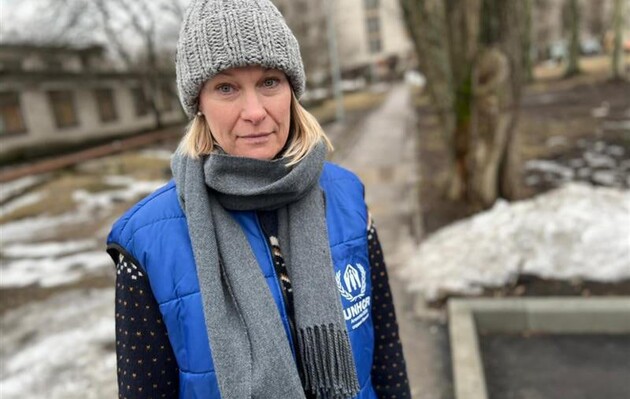A UNHCR spokeswoman spoke about the difficult situation in the country.

Since the beginning of the war, almost a quarter of the population has moved from their place of residence within a month. This was stated by UNHCR Representative in Ukraine Carolina Lindholm Billing, speaking from Lviv at a press briefing at the Palais des Nations in Geneva on March 25, 2022. ZN.UA publishes the full text of her speech .
“Everything has changed in Ukraine over the last month. Just two weeks before the war, I spent a week in eastern Ukraine with the director of the United Nations Development Program (UNDP) in Ukraine. We opened and visited public centers in Avdeevka and Popasnaya for children with disabilities and the elderly. These centers are now probably in ruins, as are many other private homes and social institutions that humanitarian and development partners have helped build and renovate over the past eight years, working with local authorities and communities in eastern Ukraine.
The past month has changed those events and pushed us further than we did eight years ago. Today, we are facing the realities of a large-scale humanitarian crisis that is growing by the second.
The seriousness of the situation cannot be overestimated.
In one night, life was ruined and families were torn apart. In one month, more than 10 million people were forced to flee, saving their lives, leaving their homes and belongings. More than 6.5 million people have been displaced within Ukraine, and another 3.7 million have been forced to flee the country. These numbers are growing every day. Some 13 million people are stuck in affected areas or unable to leave due to increased security risks, the destruction of bridges and roads, and a lack of resources or information on where to find safety and shelter.
Today, millions in Ukraine live in constant fear. Indiscriminate shelling and heavy bombing have forced people to hide in bomb shelters and shelters for hours day and night.
The same applies to UNHCR colleagues in Ukraine, who are now working in new offices in Dnipro and Vinnytsia, Uzhhorod, Chernivtsi and Lviv, as well as in the Donetsk and Luhansk oblasts, which are temporarily out of government control. Many local workers themselves became internally displaced; for several it is the second or third time since 2014. Despite this, they did not stop working. The devotion with which they help other displaced persons is inspiring.
There are now 154 colleagues in Ukraine, some of whom have come to strengthen us in an emergency, and people continue to come to strengthen our capacity to implement on-site assistance programs. Everyone works around the clock.
Local communities, volunteers, municipalities and the government respond to humanitarian needs. From the first minute of the war, the local efforts we saw were truly remarkable, and our goal is to strengthen and complement national and local capacities. This is becoming increasingly necessary as the humanitarian crisis grows.
In Ukraine, the UN Refugee Agency operates within the framework of interagency humanitarian assistance under the leadership of the UN Crisis Coordinator. We are focusing our efforts on the protection, shelter and assistance of monetary and non-food products in order to immediately support those fleeing the war. We help displaced people find stability and a safer place while the situation remains volatile and the future is unpredictable.
UNHCR teams and our local NGO partners have been deployed at border crossings, transit and reception centers. We also approached areas directly affected by the bombing to provide immediate protection advice and essentials.
More than 1,000 households affected by the fighting have received emergency repair kits so that they can repair damaged homes and protect themselves from rubble. Reception centers in central and western Ukraine received mattresses, blankets and kitchen sets, which allowed them to expand their capacity to house IDPs. Thanks to this support, at least 85,000 people will be able to find temporary shelter. This week alone, UNHCR delivered 20,000 packages of non-food items to victims and reception centers. Of course, this is not enough to meet all needs, but we are looking for opportunities to reach out to people who really need it.
Together with the local authorities in the places where IDPs are located, we are identifying buildings for reconstruction and conversion into reception centers and places of compact residence, as the need for asylum is enormous. It is not just about immediate asylum; It is clear that hundreds of thousands if not millions of IDPs will need housing support in the medium and long term.
Last week in Vinnytsia, I met a mother with a 20-year-old daughter with a disability who is in one of the reception centers supported by UNHCR. Their apartment near Kiev was damaged. It was clear to me that they would not be able to leave this center in the near future. They, like other vulnerable families with whom I spoke at the same IDP reception center, will need housing in a compact residence or social housing for months or years.
Our teams are working to implement our protection, housing and assistance programs not only in the west of the country, but also as far as possible in central and eastern Ukraine, to provide access to housing and vital services. We have started implementing our multi-purpose cash assistance program in Lviv and Zakarpattia oblasts, and today we have registered thousands of people. Further recruitment in six additional regions of Central and Eastern Ukraine will take place in a few days. In total, we aim to reach at least 360,000 displaced persons to help them meet their basic needs.
At the same time, we continue to try to reach the extremely severely affected by the shelling, such as Mariupol and Kharkiv, with vital assistance in interdepartmental humanitarian convoys. UNHCR joined the column that entered Sumy last week.
However, it is clear that individuals, families and communities will need protection, housing, assistance and access to basic services such as health, education and social protection for years, if not decades. The consequences of this war are devastating and far-sighted.
An effective form of humanitarian assistance would be to end this war. In the meantime, we must continue to do our utmost to support all those affected. “
Read also: The United States plans to accept 100,000 refugees from Ukraine – NYT
Earlier it was reported that the invasion of the Russian Federation on the territory of Ukraine forced more than 3.3 million Ukrainians to go abroad , almost 6.5 million became internally displaced persons. 1.5 million children have left Ukraine since the beginning of the war. Lawyer Anna Bogdanets tells in her text “Refugees from Ukraine: Getting Protection Abroad” how to best get a job abroad and whether to get refugee status .
See the special topic: Antidotes for chemical poisonings are given to the Russian military – Center for Counteracting Disinformation at the National Security and Defense Council Experts report on the possibility of Russians using the nerve agent “sarin”. CNN: Defeat in Ukraine will break Putin's dream of becoming the new Stalin Russian dictators have always needed victorious wars to justify their brutality. In Prague, the street near the Russian Embassy will be renamed “Heroes of Ukraine”. For the second time during the war against Ukraine, the Russian Defense Ministry told about its alleged losses. However, the figures are far from both Ukrainian data and Western intelligence data. Almost 60 churches, mosques and synagogues in eight regions of Ukraine were damaged during the war . Most of the destroyed buildings are Orthodox churches.


